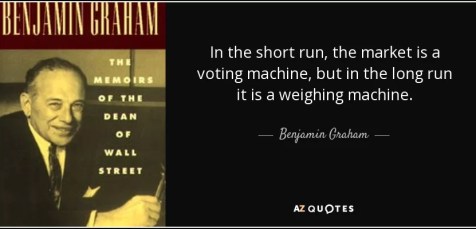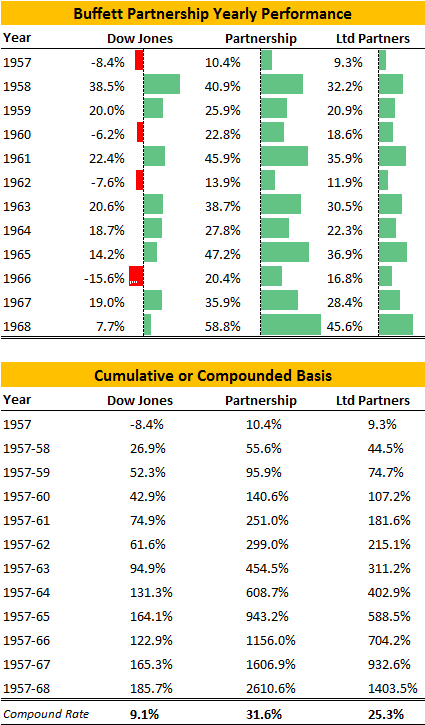2017 Performance Review – NOW Six Full Years Beating Buffett and Crushing The Market
***
Correction… I noticed a mistake I made when calculating Buffett’s Returns while doing my 2018 Performance Review.
The numbers below are now the correct ones.
Get our Guide 7 Tips to Picking Great Stocks and 3 Times You Must Sell for free to make better investment decisions today.
***
2017 is also known as the year of continuing to find a few great stocks and sit on your ass and do nothing.
Charlie Munger said this – or something similar – and it’s what I’ve done for almost 3 full years now.
I’ve bought ZERO new stock investments since April of 2015, when I bought a few great businesses, and haven’t done much since.
Why?
Well this article explains several of the reasons
Goldman Sachs says Valuations Across The Board Are At Highs Not Seen Since 1900
I’ve known this for years as I’ve searched all over the world for public company investments and around the US for multi-family apartment building investments since 2015.
But this is where we, as deep and disciplined value investors, can gain a MASSIVE advantage over other investors.
And 2017 further showed this approach of buying great companies and sitting on your ass for a few years, can make you and the people you invest in, a lot of money.
Want to learn how to find, evaluate, value, and buy great stocks fast? Ones that have helped me produce average annual investment returns of 23.5% per year on average in the first 9 years of my career? Click here to learn more about our Value Investing Masterclass.

The above quote from Benjamin Graham is one of my favorites.
It means in the short-term, emotion and psychology drive the market. But in the long-term, the market – and individual stocks – get judged on how well they’ve operated and grown over time.
This is great news for us as long-term oriented value investors.
If we can find a few great companies at cheap to fair prices and hold them for the long-term, we’ll have great returns over time. Why? Because…
“Time is the friend of the wonderful company, the enemy of the mediocre.” – Warren Buffett
With this as a backdrop, below is the 2017 performance review.
For links to 2012, 2013, 2013 updated numbers, and 2014 and 2015, 2016 performance reviews, go to the previous links.
Also, as noted above in some of the individual posts, I made multiple mistakes in 2013 when calculating my returns. The numbers below – which show the six full years between 2012 and 2017 – are correct.
2017 Performance Review
I still own all the companies from 2014 and 2015 except one. I bought 3 new companies in 2016, and ZERO investments in 2017. These investments produced a 13.5% average return in 2017.
Here are the highlights from this year:
- One of the companies I recommended while working at the investment newsletter, is up more than 300% since I recommended them in 2014 / 2015.
- One company I recommended in Press On Research was up 154.6% JUST in 2017.
- This same company has now QUADRUPLED since recommending them in 2015.
- Another two Press On Research picks from 2015 have more than doubled.
- The average market cap at the time of these recommendations was $246.4 million.
- The average market cap of the 11 companies I still own – not including the company that was bought out last year – is now $543 million.
Below is the full spreadsheet…
2017 VIJ and POR Performance Review
If you’d like to know what these companies are, you can do so by purchasing ALL past issues at a 50% discount by using this code 2018ALLISSUES in our shop today.
Note. The only product that this code will work on is the ALL issues package here. To purchase this package for 50% off, put the ALL issues package in your cart and use the code 2018ALLISSUES before checking out.
So what does this mean for cumulative full six-year returns now?
Six Full Years Beating Buffett…
Here are Buffett’s returns that I’m referencing.

I don’t compare myself to Buffett because I want to be the next Buffett. But because everyone knows who he is as he’s regarded by most as the best investor ever.
I want to be known as the first Jason Rivera when my career is over.
At the end, I want to be known as a better investor and capital allocator than Buffett and to produce better returns over time than he has so I can help millions or billions of people all over the world.
At least for now – six full years into my career – I am achieving this lofty goal by beating Buffett, when compared to the first six years of his career.
In the first six years of my career, I’ve produced average – non-compounded – returns of 27% each year. Or a total cumulative return of 162% over that period.
In the first six years of his career, Buffett produced average – non-compounded – returns of 21.5% each year. Or a total cumulative return of 128.8% over that period.
This means in the first six years of our careers, I’ve produced returns 5.5 percentage points better each year than Buffett did in the first six years of his career.
But what does this 5.5 percentage point excess return per year mean in dollar terms over this period?
Assuming we both started with an asset base of $10 million at the beginning of the six-year period, I would have grown that $10 million into $41.959 million after six years.
Buffett would have turned his investors $10 million into $32.171 million in that time.
This is why every point of excess returns is so important, and why you need to be aware of any fees charged to your account by your money managers.
Over a long period – or in this case six years – ‘only’ an excess 5.5 percentage points each year would have made investors $9.8 million extra.
And this further illustrates the power of compounding over time.
Last year, this difference between my returns and Buffett’s returns were 4.3 percentage points and a $5.7 million difference. This year, it’s a 5.5 percentage point difference and $9.8 million.
Not only am I achieving my lofty goal of beating Buffett through this time, but I’m also crushing the market as well.
And Crushing The Market
From 2012 through 2017 the Dow Jones Index produced a total cumulative return of 48.9% – or almost doubled – for the six years or 8.2% per year on average.
The S&P 500 produced a 51.3% total return – or more than doubled – for the six years or 8.6% per year on average.
And the Russell 3000 index – the closest thing to a small cap index – produced a 59% total return or 9.8% per year on average.
I’ve produced returns in excess of these indexes by 18.8%, 18.4%, and 17.2% points respectively each year over these six years.
Assuming a $10 million asset base like above, I would have produced $24.5 million more for investors over this six-year period than the Russell 3000 index would have.
- $41.959 million minus $17.5 million the Russell 3000 would have produced.
I started posting my results publicly in 2012 because this is when I began doing ‘real’, in-depth, investment research and analysis instead of speculating.
Results have been great thus far, better than I expected. But there’s still a lot of work and improvement necessary to continue this. Especially with valuations near or at all-time highs.
Other Highlights From 2017
Thanks to you investing in yourself via sales of my products, services, and consulting jobs we continued helping Mhicaella and her family in the Philippines.
The last letter we received from her mother told us that Mhicaella is now in 1st grade. She loves P.E. and is learning to read and write.
Here is a picture of Mhicaella when we first started helping her and her family…
Here is a recent picture of Mhicaella…
With your help, some of the things we’ve been able to help provide for her and her family over the last year are school supplies, medical and dental care, and Christmas gifts for her entire family.
A percentage of all sales of my books, services, and products sold will continue going towards charities like these well into the future.
We will expand on this in the future and help even more kids and their families.
Thank you so much for helping and being a part of this milestone.
***
Other highlights from 2017 are:
- Got my real estate license.
- Learned an IMMENSE amount about real estate and real estate investing.
- Put offers in on several multi-family and single-family properties.
- Didn’t get any of these deals due to excessive valuations and getting outbid.
- Did a lot of consulting work for a large firm in New York and Ohio.
- Learned an IMMENSE amount about marketing in all facets.
- Expanded my circle of competence into single family and multi-family investments.
- Grew our mailing list and social media following A LOT.
- Read around 50 books this year.
- As mentioned above we continued helping Mhicaella and her family in the Philippines survive and thrive.
- Learned several valuable skills to help my own businesses and others business.
- Got several value investment coaching clients this year.
- Began to build several value investing courses.
- Hired 4 part-time team members.
- We helped a lot more people this year than we have in the past due to the things above.
- Began building more products, services, courses, etc to help as many people as we possibly can.
- And a lot more
All this will continue to grow even more as we go forward and learn and improve.
Conclusion Thoughts
We’re still beating Buffet after six full years and crushing the market but both are catching up.
Value investing works best with a falling or stagnant market so with valuations at or near all-time highs – and reaching new highs on an almost every day basis still – this is expected.
Unless the market corrects sometime soon, I would expect Mr. Buffett and the market to continue catching up to or possibly passing us in the near future.
As I said last year at this time, barring a major sell-off I expect to add few to no companies again in 2018.
This is because I will only buy something that meets my ultra-strict criteria. Under no circumstances will I buy something because I haven’t bought in a while.
This helps keep us only in great companies and real estate investments and should help us continue producing exceptional returns over time.
No matter what the market continues to do though over time I’m confident we’ll continue to beat the market by a wide margin. And continue to compound our wealth over time.
And with the market’s march ever higher, it’s allowed me to take the time to learn other valuable business skills.
This will help us even more over the long term as we get back into buying public companies stock. And into buying private businesses and multi-family real estate investments once we reach enough revenue and cash flow.
Here’s looking forward to an even bigger and better 2018.
Thanks so much to everyone who’s been a part of this journey so far. And please let me know how I can continue to improve things going forward in the comments below.
Jason Rivera
Chairman, CEO, and Founder of Rivera Holdings LLC
Inspiring post.Keep up your excellent research and sharing.Thanks to this post I will make an extra gift to charity.
Thanks a lot Tom. Amazing to hear that you’re giving extra because of this post.